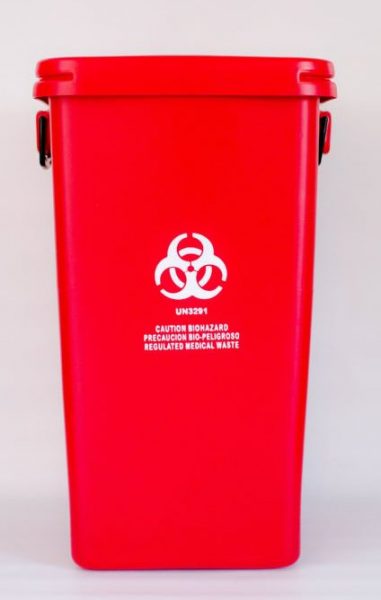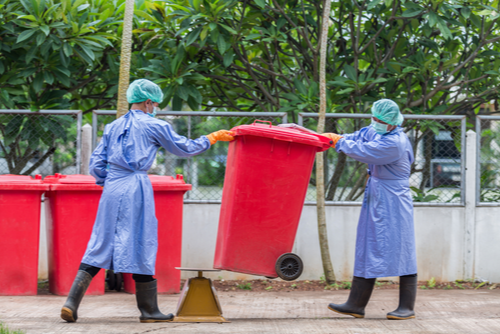Medical Waste Removal Quality: Elevating Safety And Security Standards in Your Facility
Medical Waste Removal Quality: Elevating Safety And Security Standards in Your Facility
Blog Article
Remain Ahead of Regulations: Specialist Recommendations on Medical Waste Disposal
In a globe where the health care industry is frequently progressing, it is vital for medical facilities to remain in advance of regulations when it pertains to the proper disposal of medical waste. With strict standards and frequent regulative modifications, it can be testing to navigate the complexities of this procedure. With professional recommendations, facilities can make sure conformity and mitigate dangers connected with inappropriate waste disposal. From comprehending the various groups of clinical waste to implementing the ideal collection and partition approaches, this conversation will offer actionable suggestions and important understandings to assist centers remain in advance of guidelines in the ever-changing landscape of clinical garbage disposal.
Comprehending Medical Waste Categories
Recognizing clinical waste classifications is important for proper disposal and monitoring in health care facilities. Clinical waste refers to any type of waste generated by medical care activities that may present a threat to public wellness or the atmosphere. It is critical to categorize medical waste properly to ensure its secure handling, treatment, disposal, and transport.
There are a number of groups of clinical waste that healthcare centers require to be knowledgeable about. One of the most typical groups include transmittable waste, pathological waste, sharps waste, pharmaceutical waste, and chemical waste. Each category has details guidelines and laws for its correct monitoring and disposal.
Contagious waste includes materials infected with blood or other bodily fluids, such as handwear covers, dress, and lab societies. Pathological waste refers to human tissues, body organs, or body parts that call for special handling and disposal. Sharps waste consists of used needles, syringes, and various other sharp things that can cause injury and transfer infections. Drug waste comprises expired, unused, or infected drugs that require mindful handling and disposal. Lastly, chemical waste includes solvents, disinfectants, and other chemical materials used in healthcare facilities.
Staying Up-To-Date With Regulatory Modifications
Staying present with regulative modifications is vital for health care centers to ensure compliance and proper management of clinical garbage disposal. medical waste removal service. With policies continuously developing, it is important for health care facilities to stay current to stay clear of charges, fines, and prospective harm to the setting and public wellness
To stay ahead of regulatory adjustments, health care facilities should develop a system for tracking and tracking updates. This can be done by subscribing to governing newsletters, attending meetings and workshops, and actively getting involved in market associations. In addition, facilities should mark an employee or group responsible for remaining informed and sharing info to pertinent stakeholders.
Routine communication with regulative firms is likewise vital. Health care facilities need to establish partnerships with regional, state, and government agencies to guarantee they recognize any kind of modifications in laws that might influence their waste administration techniques. This can be done through routine conferences, participation in public remark durations, and proactive interaction with governing companies.
Furthermore, medical care facilities should think about partnering with waste management business that concentrate on medical garbage disposal (medical waste disposal services with WasteX). These companies are frequently well-versed in the newest policies and can offer assistance and support to ensure conformity
Applying Correct Collection and Partition Techniques
To efficiently manage clinical garbage disposal, health care facilities have to develop proper collection and partition approaches in accordance with regulatory standards. Implementing these methods makes certain the secure handling and disposal of potentially harmful materials, protects the setting, and reduces the risk of injuries and infections to health care employees and the basic public.
Proper collection and partition methods entail using marked containers and identifying systems. Health care facilities must supply clearly classified containers for different kinds of medical waste, such as sharps, contagious waste, pharmaceutical waste, and non-hazardous waste. These containers ought to be color-coded and clearly marked to stay clear of confusion and promote simple identification.
In addition, health care centers must educate their staff on the proper procedures for gathering and setting apart medical waste. This consists of enlightening them on the different types of waste, the ideal containers to make use of, and the value of adhering to guidelines and standards. Regular training sessions and refresher course training courses should be carried out to make certain that staff members stay updated on ideal techniques.
Additionally, health care centers need to develop a system for regular collection and disposal of medical more tips here waste. This may find involve partnering with qualified waste management companies that focus on clinical garbage disposal. These firms will certainly make certain that the accumulated waste is carried and taken care of in conformity with governing needs.
Picking the Right Disposal Approaches

Incineration is among one of the most effective and usual methods for disposing of particular kinds of medical waste, such as pathological waste and sharps. It entails the controlled burning of waste at heats, minimizing it to ash. However, incineration can release harmful contaminants right into the air and add to air pollution.

Other disposal approaches consist of chemical treatment, microwave therapy, and landfilling. Chemical therapy includes making use of chemicals to disinfect and counteract the waste. Microwave treatment makes use of microwave power to heat and decontaminate the waste. Landfilling includes burying the waste in a marked garbage dump location (medical waste disposal services with WasteX). Landfilling needs to be the last hotel due to the possible risk of contamination to dirt and groundwater.
Ensuring Compliance Via Documents and Training
After carefully thinking about the suitable disposal methods for medical waste, medical care facilities should guarantee compliance with laws and decrease ecological effect by carrying out efficient documentation and training treatments. This action is important in preserving a lasting and risk-free environment for both medical care employees and the general public.

Healthcare workers that manage clinical waste ought to obtain proper training on waste segregation, taking care of, and disposal procedures. By providing thorough training, health care centers can empower their team to make informed decisions and reduce the threat of improper waste disposal.
Verdict
To conclude, staying in advance of regulations in clinical garbage disposal is vital for healthcare facilities. medical waste removal services. Recognizing the different classifications of clinical waste, staying updated with governing changes, executing correct collection and segregation methods, selecting the ideal disposal methods, and making certain conformity via documentation and training are all vital actions. By adhering to these standards, medical care organizations can efficiently take care of and get rid of of clinical waste in a risk-free and liable manner
From understanding the different categories of medical waste to implementing the ideal collection and segregation approaches, this conversation will why not check here certainly provide actionable ideas and beneficial understandings to assist centers stay ahead of policies in the ever-changing landscape of medical waste disposal. - medical waste disposal services with WasteX
The most usual categories consist of infectious waste, pathological waste, sharps waste, pharmaceutical waste, and chemical waste. Medical care facilities ought to give clearly identified containers for various types of clinical waste, such as sharps, transmittable waste, pharmaceutical waste, and non-hazardous waste. Healthcare facilities need to establish an extensive system to videotape and track all aspects of medical waste disposal, consisting of kinds of waste created, quantities, and disposal techniques utilized. Medical care employees who deal with medical waste must obtain appropriate training on waste segregation, managing, and disposal treatments.
Report this page